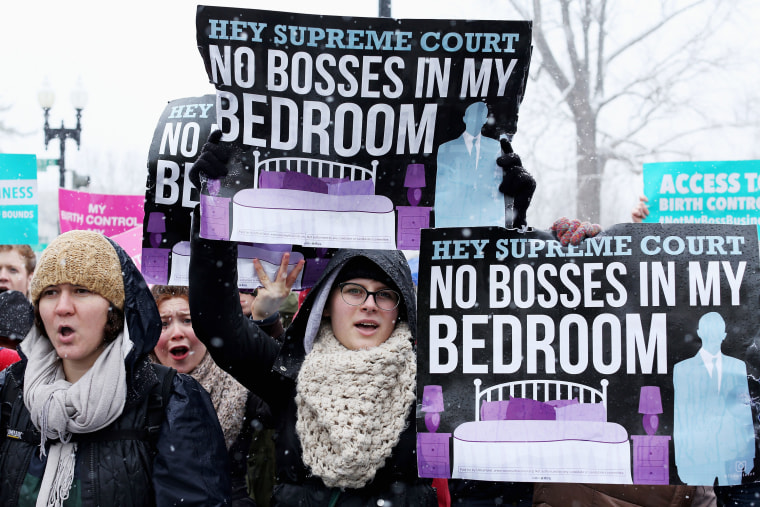The U.S. Supreme Court narrowly ruled this morning against the Affordable Care Act's contraception policy, agreeing that "closely held" corporations can deny contraception coverage under the First Amendment. Republican critics of "Obamacare" are thrilled, though I'm not sure if they've thought this through.
Senate Minority Leader Mitch McConnell (R-Ky.), for example, couldn't be more pleased.
"Today's Supreme Court decision makes clear that the Obama administration cannot trample on the religious freedoms that Americans hold dear. Obamacare is the single worst piece of legislation to pass in the last 50 years...."
House Speaker John Boehner (R-Ohio) is equally pleased.
"Today's decision is a victory for religious freedom and another defeat for an administration that has repeatedly crossed constitutional lines in pursuit of its Big Government objectives."
Keep in mind that Republicans haven't simply sat on the sidelines of this fight, hoping the court's Republican-appointed justices would rule in their favor. On the contrary, they've been active participants in the debate, filing briefs with the Supreme Court urging this outcome, proposing legislation to undo the ACA policy, and in some cases, even threatening to push a constitutional amendment if the Hobby Lobby ruling had gone the other way.
As a result, GOP lawmakers and their allies are clearly delighted today, basking in the glow of victory.
What they may not fully appreciate, at least not yet, is what happens next: the political fallout.
Republican opposition to contraception access has been largely reflexive in recent years: "Obamacare" makes birth control available to Americans without a copay; "Obamacare" is evil; ergo the right must fight against contraception access.
The trouble is, the American mainstream and GOP policymakers really aren't on the same page. The latest national polling reinforces the fact that most of the country wanted today's ruling to go the other way.
Let's revisit a piece from March, following oral arguments. Do Republicans believe it's a winning election-year message to tell many American women their access to contraception must be based in part on their bosses' religious beliefs? Because that's the line the party is taking right now. They wouldn't put in those terms, exactly, but as a practical matter, that's effectively the real-world consequence of the Republican position.
This came up quite a bit in 2012, when congressional Republicans championed a measure from Sen. Roy Blunt (R-Mo.) that would have empowered private-sector employers to deny health services that business owners find morally objectionable.
In one of the presidential candidate debates, President Obama hammered Mitt Romney over his support for the Blunt Amendment. The GOP candidate, the president said, argued "employers should be able to make the decision as to whether or not a woman gets contraception through her insurance coverage. That's not the kind of advocacy that women need."
Romney balked, saying, "I don't believe employers should tell someone whether they could have contraceptive care or not. Every woman in America should have access to contraceptives."
The trouble seemed to be that Romney heard Obama's description of Romney's own position and was repulsed. But in reality, both Romney and his running mate endorsed a policy that would leave contraception decisions for millions of workers in the hands of employers.
And if memory serves, the gender gap didn't do the GOP any favors once the votes were tallied.
Two years later, the Republican position hasn't changed. More than two-thirds of U.S. women oppose allowing corporations to drop contraception from their health plans due to spiritual objections, but GOP leaders are nevertheless saying the exact opposite.
To be sure, what matters most this morning is the ruling itself and its impact on the public. But as we come to terms with the decision and legal experts sort out its scope, it's only natural to consider the electoral impact. And with this in mind, Republicans are taking a gamble, whether they realize it or not.
Democratic campaign operatives' single biggest concern this year is getting left-of-center voters to show up and cast a ballot this fall. Last week, some Dem strategists said they were particularly concerned about whether unmarried women would get engaged this cycle.
Watching Republican-appointed justices to limit contraception access, while Republican lawmakers cheer them on, may be just what Democratic campaign officials needed.
A Democratic leadership aide told the Washington Post last fall, "This could be very helpful with younger and middle aged women.... The idea that a boss calls the shots on a woman's ability to get free birth control is really powerful. This is the kind of issue that could help change the ACA debate by reminding women in particular that at its core it's all about access and affordability."
Congratulations, Republicans, you've won your big case at the Supreme Court, and positioned yourself this election as the 21st century political party that supports restrictions on contraception access. The party saw a political landmine and decided to do a victory dance on it. We'll see how this turns out for them.
The question couldn't be more straightforward: Dear GOP candidates, do you agree with the Supreme Court on contraception access or not? The DCCC and DSCC clearly hope that in most instances, Republicans endorse today's ruling.
